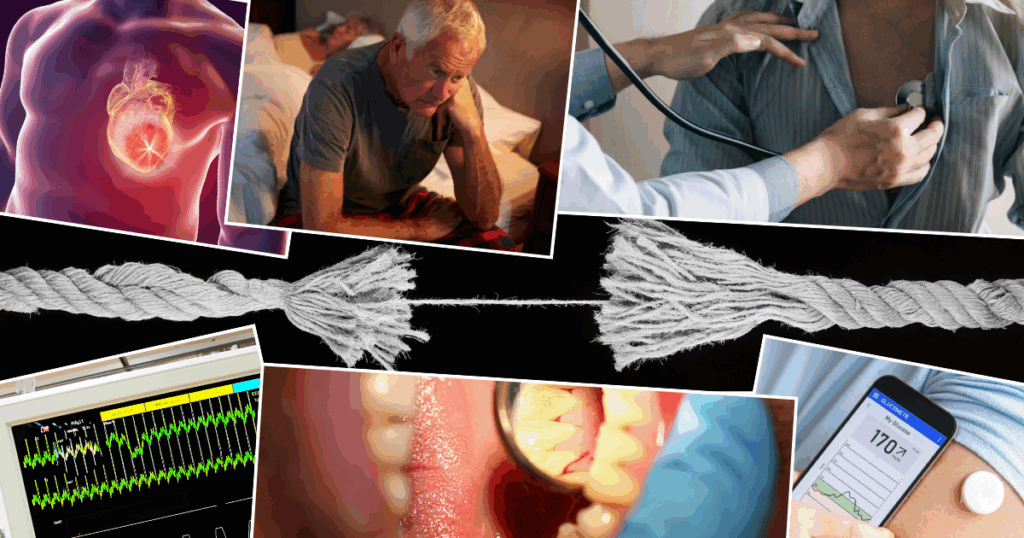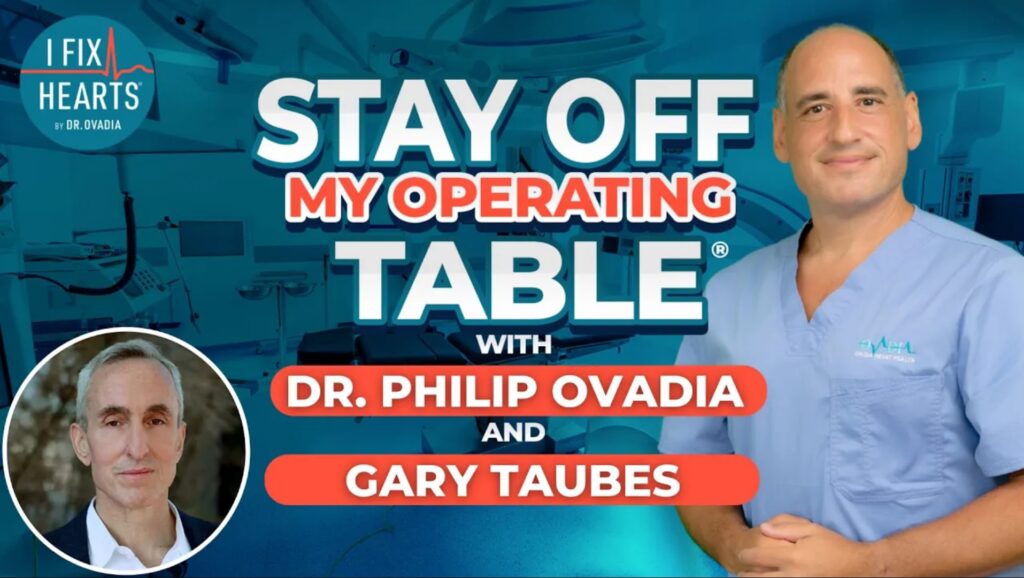The warning signs of a weakened heart begin much earlier than you’d think. There might be red flags for years before you experience traditional symptoms or experience a heart attack.
You might be familiar with some of the most common signs of heart failure, like shortness of breath or occasional angina (chest pain). But there may be other warning signs your body’s trying to tell you.
Here’s how to know if your heart’s at risk (and how to prevent things from getting worse).
The earliest signs that your heart may be in trouble
It’s true there’s no ‘one thing’ that contributes to heart disease. However, you may notice a pattern in the following factors:
Poor blood sugar control
You probably know that what you eat can affect your heart. But while nutritionists once blamed fat and red meat for heart disease, more and more research shows that it’s more about blood sugar control — and therefore more about simple sugar and carbohydrates.
We know that heart failure and hyperglycemia often occur together. However, a growing body of research suggests that blood sugar control issues are an early sign of heart failure diagnoses. This means if you’ve been diagnosed with diabetes, either type 2 or prediabetes, you may have a substantially higher risk of heart failure progression.
Other key information from the study linked above:
- An A1C result of 7% or more may indicate you have a higher risk of developing later stages of heart failure
- People with diabetes in the earliest stages of heart failure could be between 1.5 and 1.8 times more likely to develop later stages of heart failure
- Younger patients diagnosed with diabetes may develop heart failure more quickly and at a younger age than those without diabetes
Keep in mind you’re still at risk for heart problems even as a pre-diabetic. One study found that the risk of heart failure was higher for those with an A1C between 5.5% and 6.4% compared to the reference group (<5.0 to 5.4).
The obvious solution here is reducing your A1C by lowering your blood sugar. One study found that glucose-lowering medications may affect the development and progression of heart failure.
But that’s not to say there aren’t other solutions — any lifestyle change that improves blood sugar control will improve your chances of survival. Adopting a low-carb diet can help improve blood glucose levels, regulate blood lipids, and decrease insulin dose requirements for patients with type 2 diabetes.
If you’re currently living with blood sugar issues like diabetes, rest assured there are solutions. Some studies show that adopting a low-carb diet can reverse type 2 diabetes completely.
Trouble sleeping
Sleep and your heart health are tied at the hip. If you have long-term, serious problems with your sleep, you likely have problems with your heart beginning as well.
Here’s why:
- A weak heart may allow fluid to collect in your lungs and legs.
- You might find yourself waking up more frequently in the night for bathroom trips, which interrupts your sleep.
- You may also find it difficult to breathe, which causes you to wake up unexpectedly.
- Chronic cases of this may be diagnosed as obstructive sleep apnea, which continues worsening your sleep quantity and quality.
We also know that diagnoses like insomnia are closely linked with heart disease. Case in point: you may be 69% more likely to have a heart attack compared to people who aren’t diagnosed with insomnia. One study found that any disorder on “initiating and maintaining sleep” may lead to a 13% increased likelihood of experiencing a heart attack.
If you’re struggling with a sleep disorder (or have noticed problems falling and staying asleep), you may want to address anything that could be contributing to the flywheel. Sleep hygiene is certainly important, like switching off devices and making your room a little colder. But it may be worth exploring other lifestyle changes too, like monitoring caffeine and avoiding snacks before bed.
I cover more details on getting better sleep in this guide.
Mouth and dental problems
It could be argued that metabolic health starts in the mouth. Issues with your mouth, teeth, or gums could have a dramatic effect on your heart — even tooth loss could raise your risk of dying from heart disease.
It all begins with your oral microbiome, which, similar to your gut microbiota, is a delicate balance of beneficial bacteria that changes according to what you eat. So if you eat something that upsets the pH balance of your mouth (think processed food, medication, or antibiotics) you might let ‘bad’ bacteria outcompete the ‘good.’ This eventually leads to oral dysbiosis, which is just another way to say that bad bacteria are growing out of control.
This bad bacteria may pass into the bloodstream, which will eventually travel to the heart and speed up inflammatory processes. Over time, this could instigate the development of atherosclerosis, heart failure, infective endocarditis, and rheumatic heart disease.
It’s fairly simple to diagnose oral dysbiosis, starting with your personal medical history. If you have a history of recurring mouth-related issues like bad breath, bleeding gums, cavities, and ulcers, there’s a good chance there may be something out of alignment. You can also purchase test strips over the counter to measure your saliva’s pH at home.
Addressing a poor oral microbiome is equally straightforward. The most obvious solution here is to change your diet and focus on whole, real foods as often as possible. Probiotics and prebiotics may be useful in some cases, particularly if you’re recovering from acute antibiotic use.
There’s also an argument to be made for low to no sugar diets — they reduce risk factors for dysbiosis and reduce the likelihood for inflammation. High sugar intake can also affect the oral/mucosa immunity system, which opens the door to other health issues outside of heart failure alone.
What to do if you think you have a weak heart
If you’re presenting with any of the warning signs above, taking action today could make all the difference tomorrow. But that’s not to say you need to do everything perfectly: your goal right now should be getting clarity around your health.
First, you can take my metabolic health quiz to get a better idea of where you’re at.
Then, you can schedule a CAC scan that takes a look at your heart plaque so you can choose a course of action.

Celebrating 200 Episodes – A Special Gift
To celebrate the 200th episode of my Stay Off My Operating Table podcast, I sat down with none other than Gary Taubes — the legendary science journalist whose books introduced the low-carb way of eating to thousands… myself included.
It’s a milestone conversation, and to mark the occasion, I want to give you something that could change your life.
For a limited time, while supplies last, I’m offering a free copy of my best-selling book Stay Off My Operating Table. Just cover the shipping, and it’s yours.
Claim your free copy at ifixhearts.com/200

